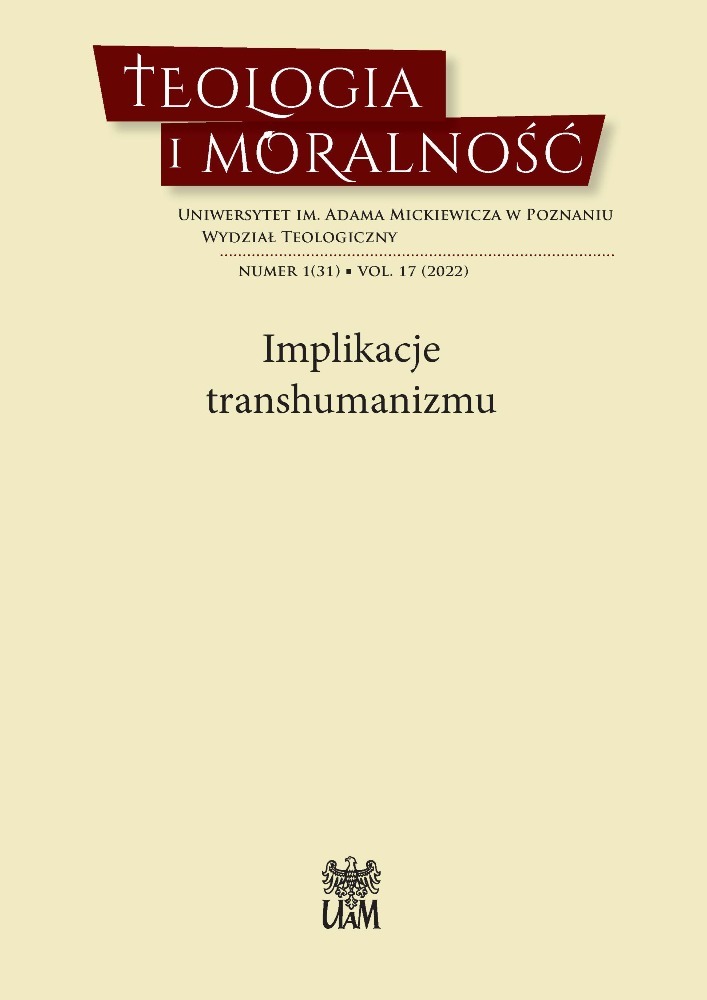Abstract
The article presents biological, social and technological-cultural evolution and biological-technological and purely cultural evolution. The last two are accompanied by the ideology of transhumanism and their basis is the new integrated technologies used in the current fourth industrial revolution and the planned fifth. Transhumanism seems to be replacing the traditional humanities. It aims to affirm the technicisation of inorganic and biological structures, including the human being, first bionised, then cyborgised and finally virtualised. The natural and social environment is to be technicised. Ontic and ethical problems arising in the face of the symbiosis of natural and technical entities are pointed out.
References
Askland, Andrew (Sandy). 2011. A Misnomer of Transhumanism as Directed Evolution. International Journal of Emerging Technologies and Society, 9(1).
Blackmore, Susan. 2002. Maszyna memowa, tłum. Norbert Radomski. Poznań: Wydawnictwo Rebis.
Bostrom, Nick. 2005. Transhumanist values. Review of Contemporary Philosophy, 4(1-2), 87-101.
Brodie, Richard. 1997. Wirus umysłu, tłum. Piotr Turski. Łódź: TeTa Publishing.
Cecchetto, David. 2013. Humanesis. Sound and technological posthumanism. Minneapolis–London: University of Minnesota.
Clines, Manfred E. i Nathan F. Kline. 1960. Cyborg and Space. Astronautics, September, 26-27, 74-76.
Dawkins, Richard. 1996. Samolubny gen, tłum. Marek Skoneczny. Warszawa: Wydawnictwo Prószyński i S-ka.
Dobzhansky, Theodosius. 1937. Genetics and the Origin of Species. New York: Columbia University Press.
Esfandiary, Fereidoun M. 1989. Are You a Transhuman: Monitoring and Stimulating Your Personal Rate of Growth in a Rapidly Changing World. New York: Warner Books.
Grabińska, Teresa. 2018. Bezpieczeństwo osoby i wspólnoty. Ochrona bytu osobowego w obliczu ideologii i praktyki transhumanizmu. Wrocław: Wydawnictwo AWL.
Grabińska, Teresa. 2021. Czy świat wirtualny jest symulacją?. W: Ulepszanie poznawcze człowieka. Perspektywa filozoficzna, red. Piotr Duchliński i Grzegorz Hołub, 307-334. Kraków: Wydawnictwo Naukowe Akademii Ignatianum.
Grabińska, Teresa. 2022. Dylematy transhumanizmu II: wartości transhumanistyczne a optymalizacja technologiczna. Teologia i Moralność, 17, 45-59.
Hayles, Nancy Katherin. 1999. How We Became Posthuman. Virtual Bodies in Cybernetics, Literature, and Informatics. Chicago–London: The University of Chicago Press.
Hołub, Grzegorz. 2018. Ulepszanie człowieka. Fikcja czy rzeczywistość?. Kraków: Wydawnictwo Naukowe Akademii Ignatianum.
Huxley, Julian. 1957. In New Bottles for New Wine. London: Chatto &Windus.
Huxley, Julian. 1948. Man in the Modern World: An Eminent Scientist Looks at Life Today: Selected Essays from „Man Stands Alone” and „On Living in a Revolution”. New York: New American Library.
Jodkowski, Kazimierz. 2006. Rodzaje procesu ewolucyjnego i sens przypadku. Filozofia Nauki, XIV nr 1(53).
Kopania, Jerzy. 2021. Transhumanizm jako magia racjonalna. W: Bezpieczeństwo personalne a bezpieczeństwo strukturalne, t. 11: Instrumentarium wojny kulturowej, red. Teresa Grabińska i Piotr Szczepański. 139-167. Wrocław: Wydawnictwo AWL.
Lem, Stanisław. 2020. Suma technologiae. Kraków: Wydawnictwo Literackie.
Locke, John. 1955. Rozważania dotyczące rozumu ludzkiego, t. 1, tłum. Bolesław J. Gawecki. Warszawa: Państwowe Wydawnictwo Naukowe.
Longo, Francesco, Antonio Padovano i Steven Umbrello. 2020. Value-Oriented and Ethical Technology Engineering in Industry 5.0: A Human-Centric Perspective for the Design of the Factory of the Future. Applied Science, 10, 4182-4206. DOI:10.3390/app10124182.
Malinowski, Bronisław. 2000. Dzieła, t. 9: Szkice z teorii kultury, tłum. Antoni Bydłoń i Anna Mach. Warszawa: Wydawnictwo Naukowe PWN.
Manor, Ilan. 2019. The Digitalization of Public Diplomacy. Cham (Switzerland): Springer Verlag GmbH.
Maritain, Jacques. 1988. Pisma filozoficzne, tłum. Janina Fenrychowa. Kraków: Społeczny Instytut Wydawniczy ZNAK.
Mayr, Ernst. 1991. One Long Argument: Charles Darwin and the Genesis of Modern Evolutionary Thought. Cambridge: Harvard University Press, Cambridge.
Nowacka, Maria. 2016. Bezpieczeństwo zdrowotne: od perswazji do przymusu. W: Bezpieczeństwo personalne a bezpieczeństwo strukturalne, t. 4: Bezpieczeństwo w antroposferze i infosferze, red. Teresa Grabińska i Zbigniew Kuźniar. Wrocław: Wydawnictwo WSOWL.
Nowacka, Maria. 2021. Od policji medycznej do zdrowia publicznego. Rozwój administracji zdrowotnej w XIX w. W: Bezpieczeństwo personalne a bezpieczeństwo strukturalne, t. 10: Oręże informacyjne, red. Teresa Grabińska i Norbert Świętochowski. Wrocław: Wydawnictwo AWL.
Nowacka, Maria i Jerzy Kopania. 2019. Transhumanistyczna definicja zdrowia. W: Bezpieczeństwo personalne a bezpieczeństwo strukturalne, t. 8: Oznaki przełomu kulturowego, red. Teresa Grabińska i Zbigniew Kuźniar. 109-121. Wrocław: Wydawnictwo AWL.
Parfit, David. 1986. Comments. Ethics, 96(4), 832-872.
Parfit, David. 1984. Reasons and Persons. Oxford: Oxford University Press.
Richta, Radovan et al. 1966. Civilizace na rozcestí - společenské a lidské souvislosti vědecko-technické revoluce. Praha: Vydavatel Svoboda.
Savulescu, Julian. 2003. Human-Animal Trasgenesis and Chimeras Might Be an Expression of our Humanity. Journal of Bioethics, 3(3). 22-25. DOI:10.1162/15265160360706462.
Znaniecki, Florian. 2013. Upadek cywilizacji zachodniej. Warszawa: Wydawnictwo Uniwersytetu Warszawskiego.
License
Copyright (c) 2022 Teresa Grabińska

This work is licensed under a Creative Commons Attribution-NoDerivatives 4.0 International License.

